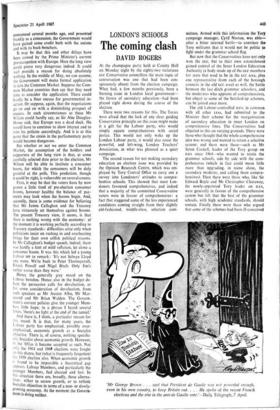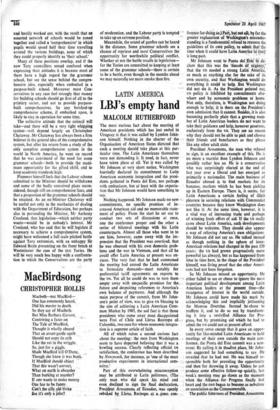The coming clash
DAVID ROGERS LONDON'S SCHOOLS
At the champagne party held at County Hall on Monday night by the eighty-two victorious cLc Conservative councillors the main topic of conversation was one that had been con- spicuously absent from the election campaign. What had, a few months previously, been a burning issue in London local government— the future of secondary education—had been played right down during the course of the election.
There were two reasons for this. The Tories were afraid that the lack of any clear guiding Conservative principle on this issue might make it a gift for the Labour party, who would simply equate comprehensives with social justice. This would not only wake up the London Labour party, it would also rouse the powerful, and left-wing, London Teachers' Association, in what was planned as a quiet campaign.
The second reason for not making secondary education an election issue was provided by the Opinion Research Centre, which was em- ployed by Tory Central Office to carry out a survey into Londoners' attitudes to compre- hensive schools. This showed that most Lon- doners favoured comprehensives, and indeed that a majority of the committed Conservative voters were in favour of comprehensives: a fact that staggered some of the less experienced candidates coming straight from their slightly old-fashioned, middle-class, selection corn-
'Mr George Brown . . . said that President de Gaulle was not powerful enough, even in his own country, to keep Britain out. . . . He spoke of the recent French elections and the rise in the anti-de Gaulle vote.'—Daily Telegraph. 7 April.
mittees. Armed with this information the Tory campaign manager, Cyril Norton, was able—,
after a. bitter internal battle—to convince the Tory militants that it would not be politic to fight under the grammar school flag.
But now that the Conservatives have not only won the ow, but to their own astonishment
gained control of the Inner London Education Authority (a body made up of the °LC members for seats that used to be in the LCC area, plus one representative from each of the borough councils is the old Lcc area) as well, the battle between the last ditch grammar schoolers, and the moderates who approve of comprehensives, but object to some of the botched-up schemes, can be joined once more.
The old Labour-controlled ILEA, in common with all other LEAS, had submitted to the Minister their scheme for the reorganisation of secondary education in inner London on comprehensive lines. The Conservatives had objected to this on varying grounds. There were those who thought that the whole comprehensive idea was wrong and wanted to retain a selective system; and there were those—such as Mr Seton Cockell, leader of the Tory group on ILEA since 1964—who wanted to retain the grammar schools, side by side with the com- prehensives (which in fact could mean little more than upgrading, in name alone, the secondary moderns, and calling them compre- hensives). Then there were those who, like Sir Edward Boyle and Mr Christopher Chataway, the newly-appointed Tory leader on ILEA, were generally in favour of the comprehensive system but felt that the best of the grammar schools, with high academic standards, should remain. Finally there were those who argued that some of the schemes had been ill-conceived
and hastily worked out, with the result that an assorted network of schools would be zoned together and called a 'comprehensive' in which pupils would spend half their time travelling around the various buildings, none of which they could properly identify as 'their school.'
Many of these positions overlap, and if the new Tory councillors sound confused when expressing their attitudes it is because most of them have a high regard for the grammar school, but see the sense behind the compre- hensive idea, especially when embodied in a purpose-built school. Moreover most Con- servatives in any case feel strongly that money for building schools should go first of all to the priniary sector, and not to provide purpose- built comprehensives. So any botched-up comprehensive scheme, if embarked upon, is likely to stay in operation for some time.
The collective attitude that the council will take—and there will be a very tight whipping system—will depend largely on Christopher Chataway. Mr Chataway has always been a firm believer in the general idea of the comprehensive system, but after his return from a study of the only complete comprehensive system in the world in North America, he went on record that he was convinced of the need for some grammar schools—both to provide tile maxi- mum opportunity for the gifted child, and to keep academic standards high.
Plummer himself feels that the Labour scheme submitted to the Minister should be withdrawn and some of the badly conceived plans recon- sidered, though still on comprehensive lines, and that a proportion of the grammar schools should be retained. As an ex-Minister Chataway will be useful not only in the mechanics of dealing with the Department of Education, but perhaps also in persuading the Minister, Mr Anthony Crosland, that legislation—which neither party wants—would be in nobody's interest. Mr Crosland, who has said that he will legislate if necessary to achieve a comprehensive system, might have welcomed a full scale pitched battle against Tory extremists, with an unhappy Sir Edward Boyle presenting on the front bench at Westminster the case of the GLC Tories. He will be very much less happy with a confronta- tion in which the Conservatives are the party of moderation, and the Labour party is tempted to take up an extreme position.
Meanwhile, the sound of gunfire can be heard in the distance. Some grammar schools see a chance of reprieve and most Conservatives the opportunity for worthwhile political conflict. Whether or not the battle results in legislation— for the Tories are committed to keeping at least some of the grammar schools—there is certain to be a battle, even though in the months ahead we may naturally see more smoke than fire.







































 Previous page
Previous page